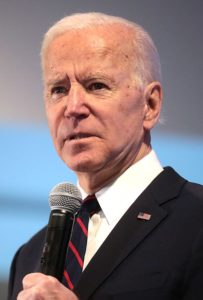If Biden Wins, He Should Continue to Put ‘Maximum Pressure’ on Iran

Gage Skidmore from Surprise, AZ, United States of America, CC BY-SA 2.0 <https://creativecommons.org/licenses/by-sa/2.0>, via Wikimedia Commons
Last week, Reuters reported that, should Joe Biden win the presidency in 2020, he would be willing to either reenter the 2015 Joint Comprehensive Plan of Action (JCPOA) — the Iran nuclear deal — or renegotiate a conciliatory deal with Tehran in a fashion similar to the negotiations that wrought the JCPOA. Biden has remained a critic of the Trump Administration’s “maximum pressure” campaign against Iran, referring to the schedule of harsh sanctions as a “dangerous failure.” But should the former vice president become president, reviving the effectively defunct JCPOA would be a mistake, as it draws on failed foreign policy theses and would only alienate our allies in the region, while emboldening the Iranian regime.
First and foremost, the Middle East of today differs dramatically from the one Biden encountered as vice president under president Obama. The formation of the burgeoning anti-Iran coalition, having materialized under the Abraham Accords, grants credence to the notion that Iran is indeed the actor in the region whose aggression and proxy fighting is most reviled. The Iran nuclear deal did not necessarily debate this proposition, but it did not embrace it either — a basic premise of the deal’s existence was that Iran had the capacity to engage in good faith action. Indeed, as part and parcel of this sentiment, the JCPOA came to largely reflect Obama’s now infamous comment that our Arab allies should learn to simply “share” the region with Iran — and in turn, learn to live with Iranian aggression.
Fundamentally, an end to the maximum pressure campaign and reentry into a JCPOA-like mechanism would signal a softening on Iran that would only distance our friends in the region, who view Iran (rightfully so) as the greatest geopolitical threat to stability in the Middle East. For allies like Saudi Arabia, which currently faces Iran-backed forces in Yemen, the prospect of a reinvigorated Iran is anything but encouraging. This fact remains especially true since high-ranking Biden foreign policy advisor Antony Blinken has discussed polices that would effectively place more pressure on our ally Saudi Arabia while relieving pressure on our adversary Iran, from ending all support for Saudi forces in Yemen to pressuring Riyadh on its domestic human rights record.
Saudi Arabia is not alone in its wariness of increased Iranian aggression. The UAE and Bahrain’s decision to normalize relations with Israel was driven in part out of concern over Tehran’s aggressive machinations in the region, which include inter alia funding destabilizing proxy wars in Yemen, Lebanon, Gaza, and Syria in the hopes of exporting the decades-old Islamic revolution and threatening the Gulf States’ access to the Strait of Hormuz and beyond, a lifeline for oil shipments. Indeed, several drone strikes by Iran last year, including one on tankers anchored at the Emirati port of Fujairah and one on installations at the Saudi port of Abqaiq served as a loud reminder to the Gulf states of Tehran’s ability to effectively sabotage the oil market, placing Iran front and center in terms of regional concerns.
Finally, if the responses to the Iran nuclear deal are any indication, the lifting of sanctions, in conjunction with an expanded JCPOA 2.0, would only serve to salvage the crippled economy of the repressive Iranian regime, giving it renewed strength following an embittered period under maximum pressure. When sanctions were lifted as a component of the Iran nuclear deal, the Iranian economy grew by over 12% from April 2016 to March of 2017, thus throwing the abusive regime a much-needed economic lifeline in the form of cold hard cash for its regional aggression and for upgrading its arms and missile industries. It is not unreasonable to predict a similar result, should Biden revive the JCPOA or pursue something like it.
With regards to Iran’s nuclear program, the outlook under Biden’s initiatives seems bleak, in large part because Iran has never been a good faith actor, yet any potential progeny of the JCPOA would be premised on such.
In early 2018, Israeli intelligence seized Iran’s “Nuclear Archive,” which included a host of documents indicating that by 2003, Iran had been devising a way to decentralize its nuclear program without substantively dismantling it. Effectively, Iran had not complied with a prior halt order to stop nuclear activity, and its nuclear program was far more advanced than the international community had anticipated in the days leading up to the JCPOA. And even during the JCPOA implementation period, as outlined in a recent JINSA report, Iran engaged in non-compliance following the US departure from the deal, violating the deal’s restrictions on the production of fissile materials and placing itself on a three- to four-month breakout timeline.
Whoever is president will likely try to get a new deal with Iran, and thus, it is imperative that neither Trump nor Biden look to the JCPOA for any guidance. Though Trump has not outlined specific details of what a new deal with Iran might look like, Biden has explicitly stated his interest in resurrecting the Iran nuclear deal. But it is worth remembering the following: the prescription for the Middle East of 2015 was barely effective then, and it very likely won’t be effective now.
Erielle Davidson is a Senior Policy Analyst at the Jewish Institute for National Security of America’s (JINSA) Gemunder Center for Defense & Strategy.
Originally published in The Algemeiner